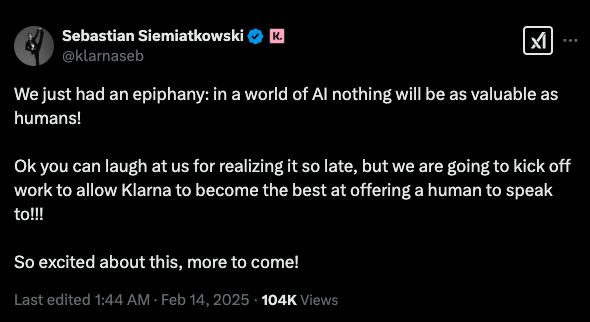AI vs Human Support: Klarna's Reversal Shows Why Customer Service Still Needs the Human Touch
‘We're replacing 100% of our customer support team with AI agents.’ - Klarna CEO, February 27, 2024
‘Actually, customers really like interacting with humans.’ - Klarna CEO, February 14, 2025
Klarna’s recent AI reversal highlights an important lesson for any company that relies on live customer support: while automation can be powerful, human connection is crucial - especially in verticals like financial services where trust is critical.
Customer support isn’t just a cost center - it’s a strategic asset
Support teams are often seen as dispensable - something that can simply be automated in the name of efficiency. But having built, led and worked alongside support and success teams, I’ve seen firsthand that these roles aren’t just about answering tickets - they’re often the tip of the spear for your company.
In reality, they often are the glue holding together your product and users, the first line of defense when something goes wrong. When support leadership is aligned with the rest of the business it can become the backbone of acquisition, retention and upselling efforts. (When given the right tools and a seat at the table, highly efficient support teams can also become an invaluable internal talent pipeline.)
AI can make support teams leaner, smarter and more effective - without replacing them
The rush to automate customer interactions - or other key support functions - can overlook a simple truth: people like talking to other humans in times of need.
This is especially true in financial services, where trust and precision are critical. Support conversations are high-value relationship moments - the ones that make or break customer loyalty. AI is incredible for handling repetitive, routine work, but it can’t replicate human judgment when things get complex or emotionally charged.
That’s why the smartest companies will build hybrid models—leveraging AI to streamline processes while keeping humans at the heart of customer interactions. AI should enhance support teams, making their work easier, faster, and more effective. Leveraging this knowledge and the insights derived from support interactions can become an invaluable qualitative and quantitative resource for your product, engineering, marketing and leadership teams.
Strong support teams are a competitive advantage, not a liability
Replacing an entire support unit with AI doesn’t just eliminate jobs - it wipes out a company’s institutional knowledge and a vital talent pipeline. The best people handling your support queue likely have an unparalleled understanding of your product and users. Your next great associate product manager, compliance lead or data analyst might already be in your support org, skillfully managing tickets while building an internal knowledge base.
Who else spends more time living and breathing the pain points of your users?
Who has handled thousands of customer interactions with empathy and patience to drive retention and loyalty?
Who better understands the cultural nuances of your user base?
Support teams don't just solve problems - they translate your company's values into everyday interactions, bridging the gap between your brand, product and users. They're often the first to spot when features, messaging and expectations aren’t aligned or causing significant friction.
I’ve seen this work firsthand. At fast-scaling companies, I made it a priority to line up new support staff for their next role - starting from their first day on the job. Not everyone took that path, but many who did have become some of the strongest cross-functional operators I’ve worked with.
Klarna’s lesson for founders & execs
I appreciate Klarna’s willingness to push boundaries and I’ve told this story to many founders and executives since they first announced their shift to an all AI support team. Klarna moves fast, they experiment boldly and they refine their approach when new insights emerge. That’s what great companies do.
The lesson here isn’t that AI in support is inherently bad - it’s that technology should enhance human capabilities, not erase them. The best organizations are and will continue to be run by people. In the case of support units, companies should recognize them as a backbone function and the people that run them as a potent source of human capital.
The companies that balance AI with human expertise will build stronger customer relationships and drive sustainable growth. Instead of eliminating support teams, leaders should focus on equipping them with AI-powered tools, unlocking their full potential and integrating them into broader business strategy. Because in the end, AI solutions should strengthen human capacity - not replace it.


